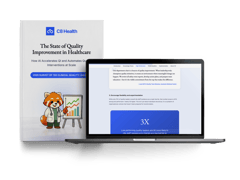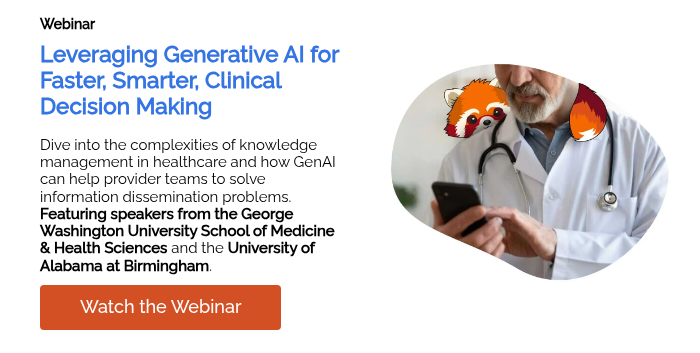
Maximizing Efficiency: The Pivotal Role of AI in Modern Healthcare
AI has become crucial for many sectors, and the healthcare industry is no exception. As innovation continues to drive medicine forward, investment in AI within the field is growing—estimated to reach $188 billion by 2030. [1]
Various AI algorithms form the backbone of software that helps medical professionals access knowledge, diagnose, and treat patients. Below, we explore types of medical AI, their uses, and vital ethical considerations.
» Improve patient care via an AI-driven knowledge management system
Types of AI in Modern Healthcare
Machine learning
Machine learning is a branch of AI that helps systems learn and improve their performance over time. It's become crucial for managing massive datasets in various industries, including healthcare. [2]
This technology uses three core learning methods:
- Supervised: Trains algorithms on labeled data to predict outcomes or classify information (e.g., image recognition, spam filtering).
- Unsupervised: Reveals patterns in unlabeled data (e.g., customer segmentation, anomaly detection).
- Reinforcement: Helps systems learn the best course of action through trial and error (e.g., game playing, robotics).
» Explore types of healthcare information technology and their uses
Natural Language Processing (NLP)
NLP helps systems understand, interpret, and generate language. This way, computers can translate, summarize, and answer questions. Systems using this technology relied heavily on hand-crafted rules and linguistic knowledge in the early days with limited success.
But, machine learning brought new ways of handling the design flaws. Systems could now learn from vast data. Finally, transformer models propelled NLP to new heights, leading to better performance. These algorithms look at the entire sentence and understand how all the words relate to each other, translating words accurately.
» Learn how to integrate AI into healthcare
Rule-Based Systems
Rule-based systems are based on a set of rules and facts. The rules dictate how to process the facts. They're essentially computerized versions of human expert knowledge in a specific field.
The principle is simple: if a specific condition is met, then they take action. For example, a rule-based medical diagnosis system might have a rule like: "If the patient has a fever, cough, and chest pain, then suspect pneumonia.
These algorithms can become complex and limited when dealing with vast amounts of data or ambiguous situations.
» Find out why consider mobile technology the future of healthcare
Applications of AI in Healthcare
Information Retrieval
A centralized knowledge management system can speed up information retrieval in healthcare. This way, medical professionals can quickly find best practices in a single place.
Medical AI technologies can improve the process using NLP. For example, C8 Health uses natural language querying and an AI assistant. Your staff can quickly retrieve information from the database by asking simple questions. There's no need to sift through piles of research.
Our latest webinar covers how AI-driven platforms like C8 Health can lead to faster, smarter decision making and better patient outcomes.
Boosting Operational Efficiency
Hospitals handle vast amounts of health data daily. They need easy access to necessary knowledge if they're to quickly decide the course of treatment. AI-powered clinical decision software helps by looking through notes, statistics, and documentation. This way, medical professionals get essential information quickly and save time.
Consider the Enhanced Recovery After Surgery (ERAS) protocol. [3] It includes specific guidelines for the preoperative, intraoperative, and postoperative care stages. The goal? Improved patient experience.
Traditionally, ERAS protocols relied on statistical models to look at data in electronic health records. But, a shift towards medical AI technologies has shown breakthroughs in operational efficiency. One study showed that they resulted in better management of length of stay. [4]
» Boost operational efficiency for your healthcare organization
Predicting Outcomes and Diagnosing
Healthcare organizations are increasingly using machine learning to analyze vast amounts of health data. It helps them diagnose diseases, predict their outcome, and choose the best treatment.
For example, machine learning can predict the onset of sepsis up to 48 hours before it occurs. [5] The algorithms do it by looking at many clinical parameters, including vital signs and lab values. This way, doctors can intervene on time and save a patient's life.
» Reduce healthcare costs with a knowledge management system
Planning Treatment Via Medical Imaging
Hospitals are performing 3.6 billion medical imaging procedures like MRIs and CT scans annually. [6] This is a massive amount of health data. AI algorithms help by analyzing it so that doctors can plan treatment.
For stroke patients, medical AI can analyze CT scans to figure out the size and location of the lesion.
» Learn ways to improve staff wellness
Challenges and Ethical Considerations
Medical AI is promising, but it raises some challenges and ethical concerns. You should address them carefully if you're to successfully implement AI into your healthcare organization.
Bias and Fairness
Machine learning models are trained on data, and if the data is biased, the model will preserve those biases. In healthcare, this can cause gaps in care, diagnosis, and treatment.
For example, if a model is trained primarily on data from Caucasian patients, it may not accurately predict outcomes for patients of color. To mitigate this, rigorous data auditing, diverse training datasets, and continuous monitoring of the AI model in healthcare is crucial.
» Discover the pros and cons of health information technology
Privacy and Security
Health data is highly sensitive, and its misuse can have devastating consequences. Protecting patient privacy via encryption, access controls, and data minimization is crucial. Additionally, patients must consent to your using their personal information for medical AI.
» Find out why cloud technology is the future of health administration
Accountability and Transparency
Machine learning models can be complex and difficult to interpret, leading to concerns about accountability. When a model makes a decision that harms a patient, it can be challenging to determine who is responsible.
Efforts to develop explainable AI in healthcare are underway. Additionally, transparency in the development and deployment of AI technologies is crucial to building trust with patients and medical professionals.
Autonomy and Human Oversight
AI can help with decision-making in healthcare, but it shouldn't replace a human touch. Medical professionals must be the ones responsible for patient care. That's why we need to establish clear guidelines for human oversight and intervention in machine learning-driven processes.
» Check out the benefits of technology in healthcare
AI-Powered Efficiency: A New Era for Healthcare
The worlds of tech and healthcare can complement each other well, especially when it comes to working on the vast amount of information that clinicians need to make decisions-and making that information more accessible than ever.
It's important to be careful about using patient information. We need doctors, computer experts, policymakers, and government officials to work together. This way, we can use AI to help patients get better without breaking any rules or being unfair.
We can look forward to a future where healthcare is more efficient, predictive, and personalized as we create more uses for medical AI.
» Simplify your operations with an AI-powered knowledge management system
References:
- "Topic: AI in healthcare," Statista, Jan. 10, 2024. Available: https://www.statista.com/topics/10011/ai-in-healthcare/
- I. E. Naqa and M. J. Murphy, "What is machine learning?," in Springer eBooks, 2015, pp. 3-11. doi: 10.1007/978-3-319-18305-3_1. Available: https://doi.org/10.1007/978-3-319-18305-3_1
- A. D. Altman et al., "Enhanced recovery after surgery: implementing a new standard of surgical care," Canadian Medical Association Journal, vol. 191, no. 17, pp. E469-E475, Apr. 2019, doi: 10.1503/cmaj.180635. Available: https://www.ncbi.nlm.nih.gov/pmc/articles/PMC6488471/
- N. K. Francis et al., "The use of artificial neural networks to predict delayed discharge and readmission in enhanced recovery following laparoscopic colorectal cancer surgery," Techniques in Coloproctology, vol. 19, no. 7, pp. 419-428, Jun. 2015, doi: 10.1007/s10151-015-1319-0. Available: https://pubmed.ncbi.nlm.nih.gov/26084884/
- C. Barton et al., "Evaluation of a machine learning algorithm for up to 48-hour advance prediction of sepsis using six vital signs," Computers in Biology and Medicine, vol. 109, pp. 79-84, Jun. 2019, doi: 10.1016/j.compbiomed.2019.04.027. Available: https://www.ncbi.nlm.nih.gov/pmc/articles/PMC6556419/
- "How AI is improving Diagnostics, Decision-Making and Care | AHA," American Hospital Association, May 09, 2023. Available: https://www.aha.org/aha-center-health-innovation-market-scan/2023-05-09-how-ai-improving-diagnostics-decision-making-and-care
- N. Sahni, G. Stein, R. Zemmel, and D. Cutler, "The potential impact of artificial intelligence on healthcare spending," Jan. 2023. doi: 10.3386/w30857. Available: https://www.nber.org/papers/w30857
FAQs
Can AI diagnose patients?
AI can assist in diagnosis by analyzing medical data and images, identifying patterns, and suggesting potential conditions. But, it can't replace human doctors, and its suggestions should be carefully evaluated alongside clinical expertise and patient information.
Can AI replace nurses?
No, AI cannot fully replace nurses. They provide emotional support, complex patient assessments, and hands-on care that AI can't replicate.
How much money can AI save in healthcare?
AI has the potential to save billions in healthcare costs. Estimates suggest it could reduce annual spending by 5-10%, or around $200-$360 billion. [7] This is mainly through improved efficiency, reduced errors, and better disease prevention.
What are the negatives of AI in healthcare?
AI in healthcare can cause bias, overreliance, ethical concerns, high costs, job displacement, and privacy and security risks.
Will surgery be replaced by AI?
No, AI will not replace surgery. While AI can assist in surgical planning, image analysis, and even robotic assistance, it cannot replace the complex decision-making, manual dexterity, and human judgment required for surgery. AI is a tool to enhance surgical capabilities, not replace surgeons.
Disclaimer: Our content serves informational purposes only and shouldn't replace the advice and services of qualified professionals. While we strive for accuracy, we cannot guarantee an entirely error-free experience. C8 Health will not be liable for any losses or damages resulting from the use of our content.


